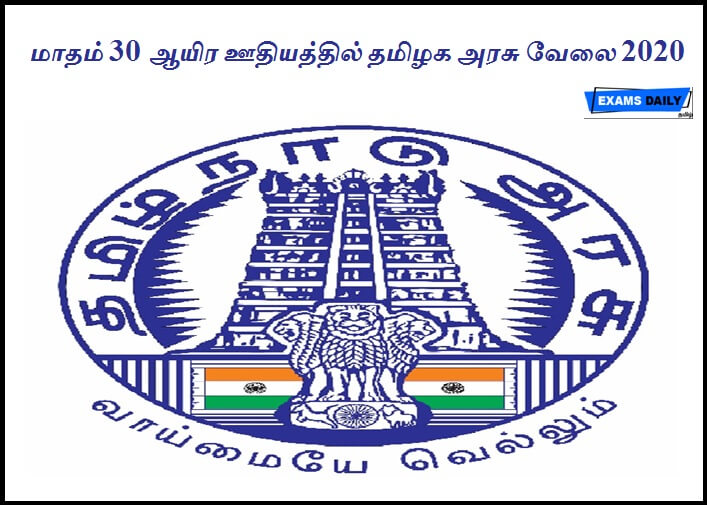TNPSC கூட்டுறவு தணிக்கை உதவி இயக்குனர் தேர்வுக்கான பாடத்திட்டம் மற்றும் தேர்வு மாதிரி!
தமிழ்நாடு அரசு பணியாளர் தேர்வாணையம் (TNPSC) ஆனது 2022 ஆம் ஆண்டிற்கான Assistant Director of Co-operative Audit பணியிடங்களுக்கான அறிவிப்பினை தற்போது வெளியிட்டுள்ளது. அதன்படி, இந்த பணிகளுக்கான ஆன்லைன் பதிவானது 21.01.2022 அன்று தொடங்கி 21.02.2022 வரை செயல்பாட்டில் இருக்கும் என அறிவிக்கப்பட்டுள்ளது.
Download Notification
எங்கள் வலைத்தளத்தில் இப்பணிகளுக்கான பணியிட தேர்விற்குரிய தேர்வு மாதிரி மற்றும் பாடத்திட்டம் ஆகியவற்றினை தொகுத்து வழங்கியுள்ளோம். பாடத்திட்டத்தினையும் தமிழ் மற்றும் ஆங்கிலம் என இரு மொழிகளிலும் தனித்தனியே வழங்கியுள்ளோம். அவற்றின் உதவியுடன் விண்ணப்பதாரர்கள் தேர்விற்கு தயாராகிக் கொள்ளும்படி கேட்டுக் கொள்கிறோம்.
TNPSC தேர்வு செயல் முறை:
- விண்ணப்பதாரர்கள் எழுத்துத் தேர்வு மற்றும் நேர்முக தேர்வின் அடிப்படையில் தேர்ந்தெடுக்கப்படுவர்.
- இந்த பணிகளுக்கான எழுத்து தேர்வானது 30.04.2022 வரை நடைபெற உள்ளது.
TNPSC AD – Cooperative-Audit தேர்வு மாதிரி :
| Subject | Duration | Maximum marks | Minimum qualifying marks for selection | |
| SCs, SC(A)s, STs, MBCs/DCs BC(OBCM)s & BCMs | Others | |||
| i. Paper –I Single paper consisting of the following subjects:- (200 Questions) (PG Degree Std) (Code No:367) Co-operation -100 Questions Commerce – 60 Questions Cost Accountancy – 40 Questions |
3 Hours | 300 | 153 | 204 |
| ii. Paper – II Part-A கட்டாயத்தமிழ் மொழித் தகுதித் தேர்வு (10ம் வகுப்புத் தரம்) (100 questions/150 marks) | 3 Hours | Note: 1. Minimum qualifying marks – 60 marks (40% of 150) 2. Marks secured in Part-A of Paper-II will not be taken into account for ranking. | ||
| ii.Part-B (General Studies) (100 questions) (150 marks) (Code No:003) General studies (Degree standard) – 75 questions and Aptitude and mental ability test (SSLC standard) – 25 questions | 150 * | |||
| iii. Interview and Records | 60 | |||
| Total | 510 | |||
TNPSC Syllabus:
PAPER-I
UNIT-I: THEORY AND DEVELOPMENT OF COOPERATION
Concept- Evolution of Cooperation– Different Cooperative Thoughts – ICA Principles – Cooperative Movement in India – Pre and Post Era- Recommendations of Various Committees of Cooperation- Features of plan periods.
UNIT-II: COOPERATIVE BANKING IN INDIA
Concept – Evolution and Functions of Credit and Non-Credit Cooperatives (Primary, District, Apex level Institutions) – National level – RBI, NABARD, NAFCUBs, NAFED, NDDB, VITTAL and COSMOS – Cooperative Banking Regulation Act.
UNIT-III: COOPERATIVE LEGISLATION AND ADMINISTRATION
Cooperative legal frame work in India – Tamil Nadu Cooperative societies Act, 1983 and Rules 1988 – Multi-State Cooperative Societies Act, 2002 – Features of Cooperative management – Cooperative Administration set-up -Functional Areas of Cooperative management – Role of Registrar – Board of Directors – members.
UNIT-IV: COOPERATIVE ACCOUNTS AND AUDIT
Cooperative Account keeping –Double entry book keeping systems –Day book–ledger- Different types of cash books – Statement of Receipts and Payments – Balance sheet – Net profit Distribution – Nature and scope of audit- Kinds of cooperative audit- Audit programme – Verification and Valuation of various books of accounts – Duties and Responsibilities of Cooperative Auditor- Audit defects- Cooperative Audit set-up and Administrative set-up.
UNIT-V: COOPERATIVE RESEARCH, EDUCATION AND MIS
Concept of Research – Research design and methodology – Collection of dataAnalysis and Interpretation – Report writing – Cooperative Education and Training (NCUI, NCCT, NCCE and ICM) – Role of Cooperative Union – Process of MIS – MS office – E-filling system in Cooperatives.
UNIT VI: FUNCTIONAL MANAGEMENT
Management: Definition of Management – Principles of Management – Functions of Management (POSDCORB).
Human Resource Management: Role and Functions of Human Resource Management – Performance Evaluation Tools: Balance Score Card, Six Sigma, 360 degree appraisal and SWOT Analysis.
Financial Management: Goals of Financial Management – Decisions of Financial Management – Capital Structure – Cost of Capital – Capital Budgeting – Working Capital Management – Risk and Return.
Marketing Management: Functions of Marketing – Marketing Mix – New Product Development- Product Lifecycle – Pricing Policies- Promotional Strategies – Channels of Distribution – Digital Marketing.
UNIT VII: LEGAL FRAMEWORK OF BUSINESS
(a) Indian Companies (Amendment) Act, 2013 – Promotion – Formation and related procedures –Types of Companies – Winding-up.
(b) Indian Contract Act, 1872 – Essential Elements of a valid Contract.
(c) Indian Partnership (Amendment) Act, 2019 – Limited Liability Partnership (LLP) Act, 2008.
(d) Industrial Laws: Factories Act, 1948 – Employees State Insurance Act, 1948 – Payment of Bonus Act, 1965 – Payment of Gratuity Act,1972.
(e) Negotiable Instrument Act, 1881.
UNIT VIII: AUDITING AND TAXATION
Auditing: Auditing of different types of undertakings – Education, Hospitals, Banks, Trusts, Clubs, Municipalities – Government Department Audit – Audit Report – Computer Aided Auditing Tools (CAAT).
Direct Taxation: Scope of total Incomes – Heads of Incomes and computation of Taxable Incomes under various heads – Assessment of incometax of Individual, Firms and Companies.
GST and Customs Act: Types of GST – Rates of GST – Input Tax Credit – Reverse Charge Mechanism (RCM) – Payment of Taxes.
Customs Act, 1962: Imported goods – Levy of custom duty – Exemptions from custom duty – Baggage Rules.
UNIT IX: FINANCIAL AND CORPORATE ACCOUNTING
Financial Accounting: Concepts and conventions of Accounting – Accounting Standards – GAAP – IAS – IFRS – Indian AS – Bank Reconciliation Statement – Accounting for non-profit organisations – Branch and Departmental Accounts – Depreciation and Insurance claims – Recent developments in accounting – Social Accounting – Forensic accounting – Computerised Accounting with TALLY – IFHRMS.
Corporate Accounting: Presentation of Financial Statements as per Schedule-III of companies Act, 2013 – Statement of Profit/ Loss, Balance sheet and Cash Flow Statement – Accounts of Banking, Electricity and Insurance companies – Human Resource Accounting – Inflation Accounting.
UNIT X: COST AND MANAGEMENT ACCOUNTING
Cost Accounting: Nature and scope – Cost centre and profit centre – Preparation of cost sheet – Tender and quotations – Applications of Costing – Operating Costing, Contract Costing, Job Costing, Batch Costing and Process Costing – Activity Based Costing – JIT system.
Management Accounting: Meaning and Significance – Analysis and Interpretation of Financial Statements – Ratio Analysis – Cash flow Statements – Budgets and Budgetary Control – Marginal Costing – CVP Analysis – BEP – Applications of Marginal Costing – Variance Analysis – Material, Labour, Overheads, Sales and Profits.








